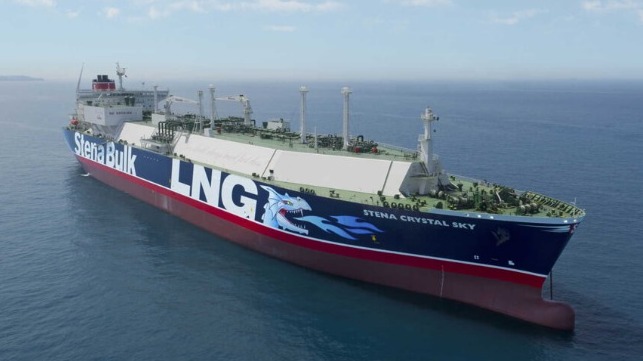Study: Carbon Capture is Costly but Feasible for Tankers

Some experts have predicted that carbon capture and storage aboard operating ships would not be practical and best suited to land installation, but a new study highlights the technical feasibility on a larger tanker while also saying cast would be a challenge. The Oil and Gas Climate Initiative (OGCI), an industry-led initiative working with data from Stena Bulk has found that mobile carbon capture in shipping is technically feasible and has a long-term role to play in meeting the industry’s decarbonization targets. It supports similar results for efforts in Japan and elsewhere.
The first phase of the study explored three classes of tankers, medium range oil/chemical tanker, a Suezmax crude oil tanker currently running on heavy fuel oil, and an LNG carrier fueled by LNG. The research used vessel technical information such as deck space, fuel use, the availability of heat and energy in the exhaust stream, from Stena Bulk.
The study findings showed that the LNG carrier offered the most straightforward path to implementing viable CCS because it had the right mix of onboard infrastructure. The Suezmax and MR tankers presented more technical challenges to implementing a CCS system. A full feasibility study was however also conducted based on the Suezmax tanker’s technical specifications because of the positive impact that a potential carbon capture and storage system would have, and to test feasibility on a ship that was representative of the global fleet.
“Carbon capture and storage is expected to play a key role in meeting the ambitions of the Paris Agreement and is a familiar process for many of the member companies of OGCI,” said Dr. Michael Traver, Transport Workstream Chair for the Oil and Gas Climate Initiative. “Extending and adapting the technology to marine vessels poses unique challenges, but also represents a great opportunity to reduce emissions from a difficult to abate sector within transportation.”
Based on these technical reviews, the study identified the biggest challenges were likely to be the cost of installation and operation, with storage tanks, compressors, and other equipment generating a large upfront CapEx barrier. Operating expenses would also increase, the study found, because of the energy required to use the CCS system effectively. However, the study found that these costs could be substantially reduced if the engine was adapted for compatibility with carbon capture and storage and they are reporting that they do not believe the challenges are unsurmountable.
The study concluded these costs were likely to be a hurdle to the deployment of CCS in the near and medium-term, but that as the technology improves and becomes cheaper to operate, it could be a persuasive option for the industry’s decarbonization trajectory. Wider context could influence this as well, the study pointed out, with commodity prices for captured carbon dioxide potentially offsetting some of the costs for owners and operators.
Erik Hånell, President and CEO of Stena Bulk, said: “These results show promise, but also make clear that there are commercial and technical challenges that our sector must overcome if we are to use CCS as a decarbonization solution. We think that it’s right that the industry is honest about the challenges it faces from a technical and commercial perspective on the pathway to decarbonization. This study proves once again that there is no silver bullet solution to meet the IMO’s climate targets, and that we must promote and adopt a wide variety of proven and commercially sensible solutions if we are to successfully decarbonize.”

that matters most
Get the latest maritime news delivered to your inbox daily.
The study, launched in October 2020, investigated the potential of capturing carbon from the exhaust gases of the large internal combustion engines that large ships predominantly use for propulsion. OGCI published the complete results online.
A similar research program was also launched in 2019 including companies from Japan, Russia, Norway, and Denmark among others while the Japanese shipping companies have been moving forward with demonstration programs. Japan’s National Maritime Research Institute (NMRI) has been studying incorporating CCS into the scrubbers fitted on ships while in October 2021, Japan’s K Line working with Mitsubishi Shipbuilding announced that they have successfully tested a demonstration unit aboard one of the line’s bulkers. Wartsila plans to install another CCS test system on a vessel by 2023.
